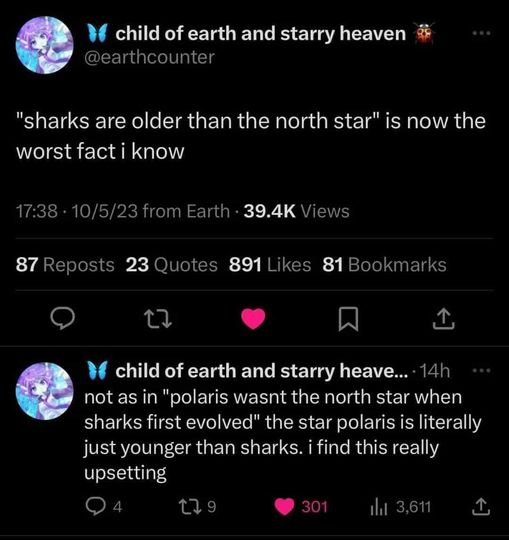this blows my mind
Science Memes
Welcome to c/science_memes @ Mander.xyz!
A place for majestic STEMLORD peacocking, as well as memes about the realities of working in a lab.

Rules
- Don't throw mud. Behave like an intellectual and remember the human.
- Keep it rooted (on topic).
- No spam.
- Infographics welcome, get schooled.
Research Committee
Other Mander Communities
Science and Research
Biology and Life Sciences
- !abiogenesis@mander.xyz
- !animal-behavior@mander.xyz
- !anthropology@mander.xyz
- !arachnology@mander.xyz
- !balconygardening@slrpnk.net
- !biodiversity@mander.xyz
- !biology@mander.xyz
- !biophysics@mander.xyz
- !botany@mander.xyz
- !ecology@mander.xyz
- !entomology@mander.xyz
- !fermentation@mander.xyz
- !herpetology@mander.xyz
- !houseplants@mander.xyz
- !medicine@mander.xyz
- !microscopy@mander.xyz
- !mycology@mander.xyz
- !nudibranchs@mander.xyz
- !nutrition@mander.xyz
- !palaeoecology@mander.xyz
- !palaeontology@mander.xyz
- !photosynthesis@mander.xyz
- !plantid@mander.xyz
- !plants@mander.xyz
- !reptiles and amphibians@mander.xyz
Physical Sciences
- !astronomy@mander.xyz
- !chemistry@mander.xyz
- !earthscience@mander.xyz
- !geography@mander.xyz
- !geospatial@mander.xyz
- !nuclear@mander.xyz
- !physics@mander.xyz
- !quantum-computing@mander.xyz
- !spectroscopy@mander.xyz
Humanities and Social Sciences
Practical and Applied Sciences
- !exercise-and sports-science@mander.xyz
- !gardening@mander.xyz
- !self sufficiency@mander.xyz
- !soilscience@slrpnk.net
- !terrariums@mander.xyz
- !timelapse@mander.xyz
Memes
Miscellaneous
See how did sharks swim north without the north being there?
Nah, they just swam East/West or South. At one point they just collected into a pile at the South Pole and waited patiently for the Polaris to come into existence.
Much of Earth's water is older than the Sun so the shark's likely swam from space is my best guess.
I mean the protons and neutrons are never new, all of this stuff is just second hand, cobbled together recycled garbage!
What is a proton? A miserable pile of quarks!
Ah those were the good old days, when we still made quarks in this country!
Like they say, we're all just nuclear waste.
Thanks for this. Now I’m on a major Wikipedia deep dive on Polaris and cepheid variables!
I just checked, Polaris is about ten times younger than sharks. The other two stars of its ternary star system are older, but not visible to the naked eye, so early sharks would not have been able to use them for purposes of navigation.
Unfortunately (or fortunately?) this appears to be untrue.
Polaris is a cluster of stars formed about 2 billion years ago. Sharks originated about 450 million years ago.
One star of Polaris (Aa) appears to be 50 million years old, but it seems likely due to a collision of stars which added mass to it.
But polaris Aa is the only visible star with naked eye. So that can be called formation of star?
So it's technically not wrong.
And yet, technically wrong
Schrödinger's fact.
Polaris is 45-67 million years old.
The oldest total-group chondrichthyans, known as acanthodians or "spiny sharks", appeared during the Early Silurian, around 439 million years ago.
It's not even close.
I came here to question whether that claim is true, saw your post, and thought something like "well, that settles that." Then I scrolled down and saw neatchee's (great username) post and now my whole world is uncertain.
Dinosaurs died off 65 MYA. Dinosaurs were most likely gone before Polaris formed.
They probably died off because they couldn’t use Polaris for navigation!
Polaris goes in and out of North Star status on the 26,000 year precession cycle. So for the duration of humanity (let's say 100,000 years), there have been decent chunks of time where it's not in use.
You gotta rest up man, that's a pretty big job for one star
Can you imagine having to give directions to a bunch of illiterate primates? Ugg. I’d have quite after the first thousand years.
They trade off. There are other stars that make for good pole star candidates
I’m now sad that dinosaurs could never look up and see Polaris.
Eh, they got to see the thousands of other stars that are now obscured by light/atmospheric pollution.
Most nights even I can barely see Polaris.
Appalachian mountains are even older
This is only sort of true, unfortunately. Polaris is a two-star system: Polaris Aa and Polaris B.
Polaris B is much older than sharks, by several billion years.
Polaris Aa appears to be younger than sharks, at a measley 50 million years old, compared to sharks' 420 million years
HOWEVER it is unclear whether Polaris Aa is actually that young. Scientists believe that, based on some contradictory findings, that measurement may be inaccurate if Polaris Aa is formed from two different stars that merged. In that scenario, the model we use to calculate star age would no longer work and could give wildly inaccurate estimates of the star's true age
TMYK
Right but how did it know to be the pole star?? Huh?
Yeah! Makes ya think!
It had the fastest lap in qualifying.
Max Verstappen approves of this comment.
Sharks are older than trees.
They're older than a lot of things. Land plants, Yellowstone, appendages,dinosaurs, doritos.
Sharks are older than trees.
But are younger than the mountains.
Some of it.
Ehhhh they're younger than some mountains though. There are ranges that are over a billion years old, but the Himalayas are "only" some 40-70 million years old, depending on when you start counting (40-50 if you actually start from being mountains, 70 if you start from "ground moves up")
Why did I read this to the tune of colors of the wind…
Sharks are older than the grinning bobcat
But are they older than why he grins?
Yellowstone
Well....
The geologic processes that led to the formation of the Appalachian Mountains started 1.1 billion years ago.
There's no shark without Mountain Mama
I refuse to believe any animal is older than doritos
No they are wrong. Doritos are eternal.
Appendages? Like, fins?
He's thinking of penguins
Like appendix I imagine.
Aren't appendages external?
One of my favorites is "the Appalachian mountains are older than bones"
and bones are I turn older than Saturn's rings, by about 300 million years
